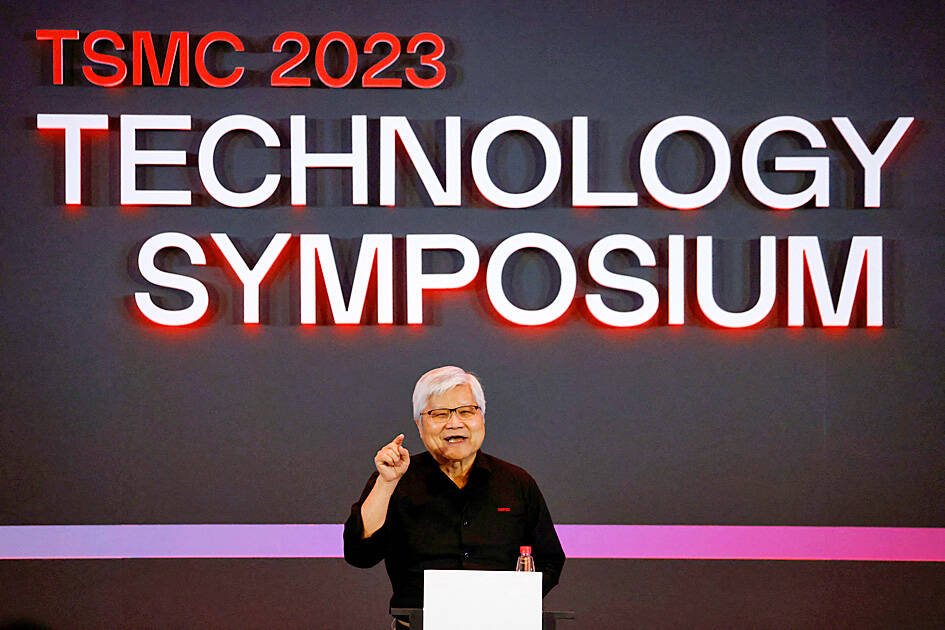Taiwan Semiconductor Manufacturing Co (TSMC, 台積電) yesterday expressed confidence that its 2-nanometer process technology would be the most advanced foundry technology in the world when it is introduced in 2025, shrugging off Samsung Electronics Co’s plans to overtake its technology leadership position.
“Today, the 3-nanometer technology we offer is the world’s most advanced technology. When we launch our 2-nanometer technology in 2025, there is no doubt in my mind that it will be the most advanced semiconductor technology in the world,” senior vice president of business development Kevin Zhang (張曉強) said in response to a reporter’s question about Samsung’s plans.
Two enhanced versions, dubbed N2P and N2X, would be launched in 2026, TSMC said during an annual technology symposium in Hsinchu.

Photo: Carlos Garcia Rawlins, Reuters
Samsung aims to surpass its bigger foundry rival TSMC to become the industry leader within five years, the Korea Economic Daily reported on Thursday last week.
The South Korean technology giant expects to get ahead of TSMC with its 2-nanometer processing node, Samsung’s head of semiconductor business Kyun Kye-hyun said during a lecture.
Samsung plans to mass produce 2-nanometer chips in 2025 as well. Its 2-nanometer technology would be based on the get-all-around structure, while TSMC adopts a nano sheet transistor structure, which it believes is a more mature technology, with less power consumption and greater performance.
In preparation for the mass production of its 2-nanometer chips, TSMC, the world’s biggest contract chipmaker, is constructing a new factory in Hsinchu and would break ground for another one in Taichung next year.
The 2-nanometer chips would be used in smartphones and high-performance-computing (HPC) devices, the chipmaker said.
Commenting on market concern about TSMC’s 3-nanometer process, Zhang said the technology’s yield would soon catch up with that of its 5-nanometer process.
“We have strong confidence in our 3-nanometer processor, which is stable,” Zhang said. “We are seeing 1.5 to two times the number of customers engaging in our 3-nanometer [technology] compared with 5-nanometer during the initial period.”
Its automaker customers are participating in a program to upgrade to a new version of 3-nanometer auto chips, called Auto Early technology, Zhang said.
The new technology would allow customers to start designing chips two to three years earlier than before and to shorten their time to market, he said.
TSMC last month said that it was unable to meet customers’ demand for 3-nanometer chips.
Most of its smartphone and HPC customers are migrating to the 3-nanometer technology, Zhang said.
TSMC chief executive officer C.C. Wei (魏哲家) yesterday in Hsinchu said that TSMC is a more reliable and trustworthy partner, as it does not compete with its customers.
“Our two competitors, one from South Korea and one based in California, develop their [own] products,” Wei said.
“TSMC does not develop [its own] products. We do not compete with you,” he told customers.
Samsung and Intel Corp are competing with TSMC to vie for a bigger market share and technology leadership.

Application-specific integrated circuit designer Faraday Technology Corp (智原) yesterday said that although revenue this quarter would decline 30 percent from last quarter, it retained its full-year forecast of revenue growth of 100 percent. The company attributed the quarterly drop to a slowdown in customers’ production of chips using Faraday’s advanced packaging technology. The company is still confident about its revenue growth this year, given its strong “design-win” — or the projects it won to help customers design their chips, Faraday president Steve Wang (王國雍) told an online earnings conference. “The design-win this year is better than we expected. We believe we will win

Intel Corp chief executive officer Lip-Bu Tan (陳立武) is expected to meet with Taiwanese suppliers next month in conjunction with the opening of the Computex Taipei trade show, supply chain sources said on Monday. The visit, the first for Tan to Taiwan since assuming his new post last month, would be aimed at enhancing Intel’s ties with suppliers in Taiwan as he attempts to help turn around the struggling US chipmaker, the sources said. Tan is to hold a banquet to celebrate Intel’s 40-year presence in Taiwan before Computex opens on May 20 and invite dozens of Taiwanese suppliers to exchange views

Chizuko Kimura has become the first female sushi chef in the world to win a Michelin star, fulfilling a promise she made to her dying husband to continue his legacy. The 54-year-old Japanese chef regained the Michelin star her late husband, Shunei Kimura, won three years ago for their Sushi Shunei restaurant in Paris. For Shunei Kimura, the star was a dream come true. However, the joy was short-lived. He died from cancer just three months later in June 2022. He was 65. The following year, the restaurant in the heart of Montmartre lost its star rating. Chizuko Kimura insisted that the new star is still down

While China’s leaders use their economic and political might to fight US President Donald Trump’s trade war “to the end,” its army of social media soldiers are embarking on a more humorous campaign online. Trump’s tariff blitz has seen Washington and Beijing impose eye-watering duties on imports from the other, fanning a standoff between the economic superpowers that has sparked global recession fears and sent markets into a tailspin. Trump says his policy is a response to years of being “ripped off” by other countries and aims to bring manufacturing to the US, forcing companies to employ US workers. However, China’s online warriors